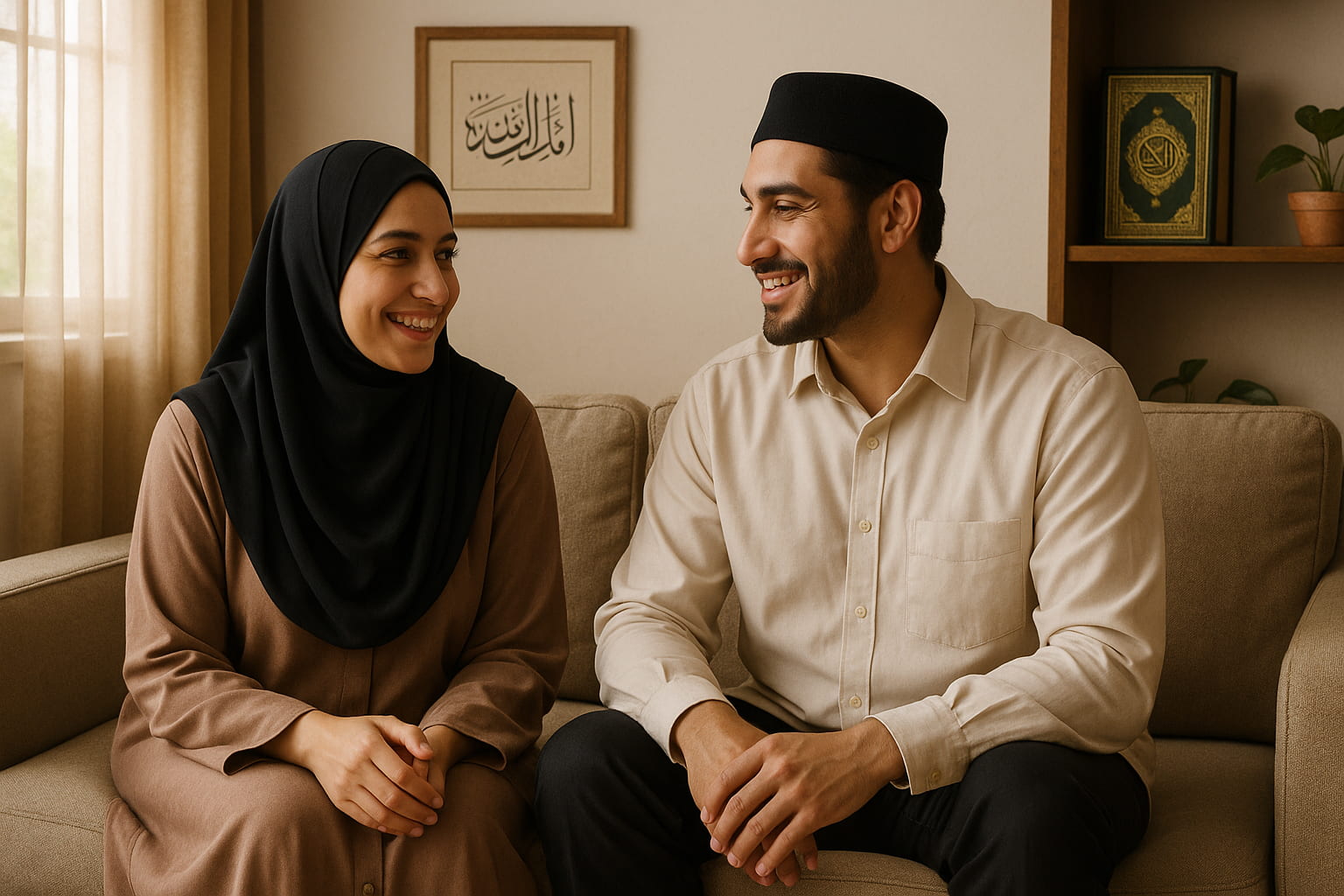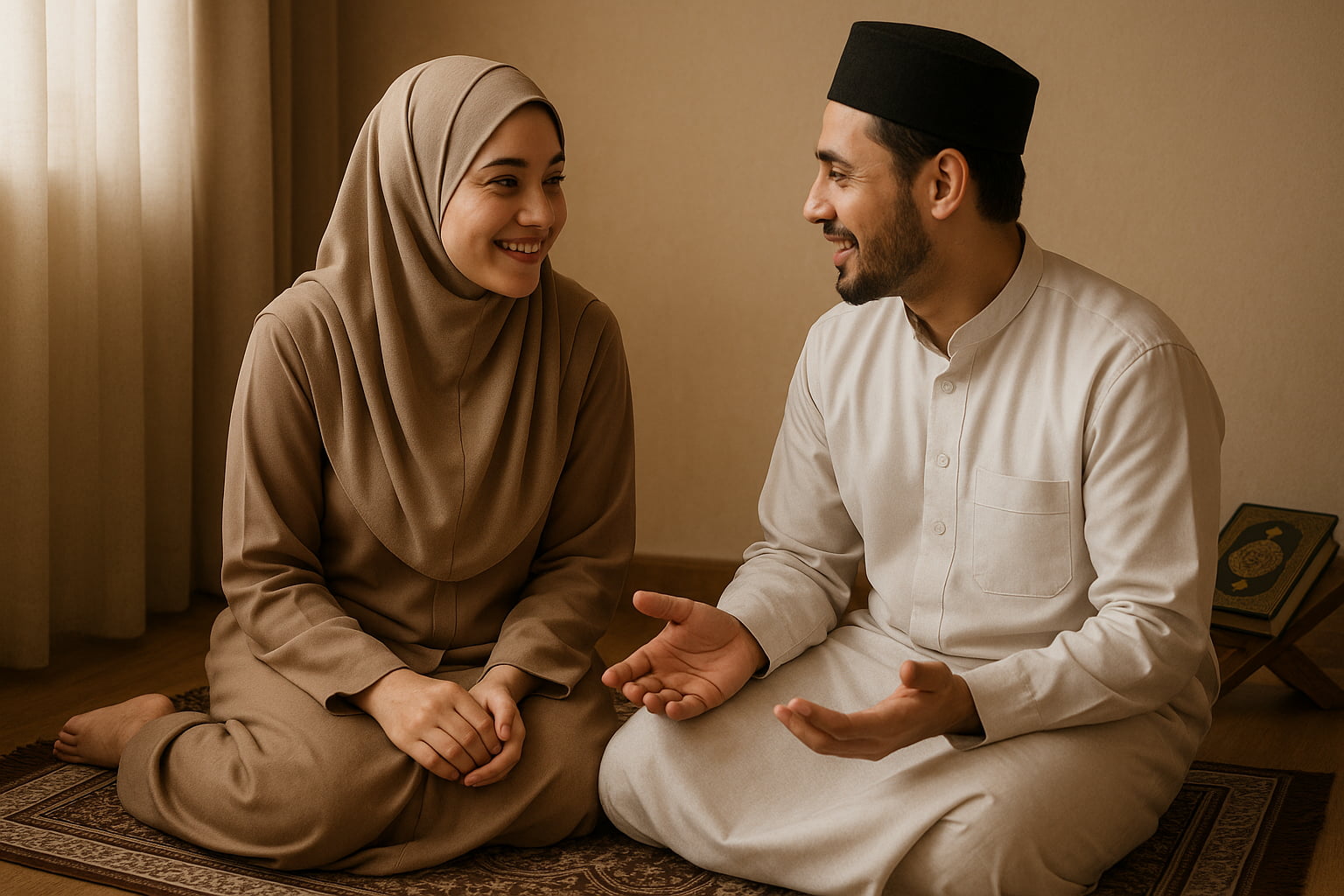In Islam, marriage is a sacred and lifelong bond founded on love, trust, and mutual respect. A key part of this relationship is effective communication with your wife, which helps nurture understanding and emotional connection. Islam places great importance on kindness, patience, and compassion within the home. When a husband follows these values, it creates a peaceful and loving environment. Strengthening communication is not just beneficial it’s a part of fulfilling one’s role with sincerity and care.
10 Best Tips for Husbands to Communicate With Their Wives
- Listen Actively
Truly listening means focusing on your wife’s words without interruptions or distractions. Show her that her voice matters by maintaining eye contact, nodding, and responding thoughtfully to what she shares.
- Speak With Kindness
Choose your words carefully and speak to your wife with kindness and respect. Harsh or hurtful language can damage trust, so always aim to communicate with love and gentleness.
- Show Empathy
Try to understand your wife’s emotions and perspectives. When she shares her feelings or concerns, acknowledge them and show that you genuinely care about how she feels.
- Avoid Criticism
Instead of criticizing, focus on constructive feedback and express your concerns with sensitivity. Pointing out flaws without care can create defensiveness and hinder open communication.
- Express Gratitude Often
Don’t take the little things for granted. Make it a habit to thank your wife for her efforts and contributions. A simple “thank you” or acknowledgment can go a long way.
- Resolve Conflicts Calmly
Arguments or disagreements are natural, but how you handle them is crucial. Stay calm, avoid yelling, and focus on finding solutions rather than assigning blame during conflicts.
- Make Time for Meaningful Conversations
Set aside dedicated time to talk without distractions. Whether it’s during meals, a walk, or before bed, meaningful conversations strengthen your emotional connection.
- Be Honest and Transparent
Honesty builds trust, which is the foundation of any strong relationship. Be open and sincere in sharing your thoughts and feelings, and encourage your wife to do the same.
- Practice Patience
Communication is a two-way street, and sometimes understanding one another takes time. Be patient with your wife’s process of expressing herself and give her the space to share fully.
- Follow the Example of the Prophet Muhammad (PBUH)
The Prophet Muhammad (PBUH) treated his wives with the utmost respect, affection, and care. Strive to emulate his example by being gentle, supportive, and understanding in all your interactions.
By applying these tips, husbands can foster a connection built on trust, respect, and love, creating a home environment that reflects the values of compassion and harmony emphasized in Islam.
The Foundation of Communication in Islamic Marriage
Marriage in Islam is seen as a spiritual and emotional partnership. The Quran describes it as a relationship of tranquility, love, and mercy:
وَمِنْ آيَاتِهِ أَنْ خَلَقَ لَكُم مِّنْ أَنفُسِكُمْ أَزْوَاجًا لِّتَسْكُنُوا إِلَيْهَا وَجَعَلَ بَيْنَكُم مَّوَدَّةً وَرَحْمَةً ۚ إِنَّ فِي ذَٰلِكَ لَآيَاتٍ لِّقَوْمٍ يَتَفَكَّرُونَ
(سورة الروم – 30:21)
“And among His signs is this: that He created for you spouses from among yourselves so that you may find tranquility in them; and He placed between you affection and mercy. Indeed in that are signs for people who reflect.”
(Surah Ar-Rum – 30:21)
This verse highlights the deep emotional connection meant to exist between spouses. Communication is a vital part of nurturing this bond; it allows both partners to express their feelings, solve issues, and grow together. Miscommunication, on the other hand, can create distance even in close relationships.
How to Communicate with Your Wife in Islam
Begin with Good Intentions (Niyyah) and Kindness in Speech
Good communication starts with the right intention. Before engaging in conversations with your wife, clarify your niyyah, or intention. Are you approaching the discussion with the goal of understanding, resolving an issue, or showing love and care? Clear intentions ensure that your words are purposeful and beneficial.
The Quran encourages believers to speak with kindness:
وَقُولُوا لِلنَّاسِ حُسْنًا
(سورة البقرة – 2:83)
“And speak to people good words.”
Respect, Listen, and Support
Respect is a two-way street in marriage. Ensure that your words and actions consistently demonstrate your appreciation for her as your partner. Listening closely to your wife’s thoughts without interrupting her shows that you value her perspective.
When engaging in discussions, offer emotional support and reassurance. Sometimes your wife doesn’t need solutions; she simply needs you to listen and empathize with what she’s experiencing.
Pay Attention to Tone, Timing, and Words
A gentle tone matters. Even valid points or suggestions can feel harsh or dismissive when spoken in anger or frustration. Choose the right time to have important discussions. For instance, a serious conversation might not be ideal when stress levels are high after a long day. Reflect on your words before you speak to ensure they promote love and understanding.
What Does the Quran Say About Treating Your Wife?
The Quran provides divine guidance on treating your wife with fairness and care. It emphasizes principles such as mercy, compassion, and justice in all interactions.
Mercy and Compassion in Marriage
وَعَاشِرُوهُنَّ بِالْمَعْرُوفِ ۚ فَإِن كَرِهْتُمُوهُنَّ فَعَسَىٰ أَن تَكْرَهُوا شَيْئًا وَيَجْعَلَ ٱللَّهُ فِيهِ خَيْرًا كَثِيرًا
(سورة النساء – 4:19)
“And live with them in kindness. For if you dislike them, perhaps you dislike a thing and Allah makes therein much good.”
(Surah An-Nisa – 4:19)
This verse underscores the importance of treating your wife with constant kindness and choosing to see the good in your relationship, even during challenging times.
The Principle of “Ma’ruf” in Interactions
The term “ma’ruf” appears repeatedly in the Quran, referring to behavior that is honorable and customary. For husbands, this concept means behaving in ways that promote her emotional, physical, and spiritual well-being.
Emotional Well-Being
Respecting your wife’s feelings and emotions is an essential part of “ma’ruf.” A husband should strive to create an environment where his wife feels secure, valued, and supported.
The Prophet Muhammad’s (PBUH) Teachings on Spousal Communication
The best example of how a husband should communicate with his wife can be found in the life of the Prophet Muhammad (PBUH). His interactions with his wives provide profound lessons in patience, kindness, and understanding.
Gentle Speech and Patience
The Prophet (PBUH) always spoke to his wives with kindness and never raised his voice in anger. He listened to their concerns and took their feelings into account, even during moments of disagreement.
Humor and Emotional Intelligence
The Prophet (PBUH) often used humor to strengthen his bond with his wives. For example, Aisha (RA) narrated instances where he would race with her, fostering a playful and close relationship.
Encouragement and Forgiveness
The Prophet Muhammad (PBUH) encouraged husbands to compliment and praise their wives. Positive affirmations strengthen emotional connections and promote self-esteem. Additionally, forgiveness was a central aspect of his approach, reminding husbands to overlook minor mistakes and focus on the bigger picture of love and harmony.
How Can I Resolve Conflicts with My Wife According to Islam?
Encouragement to Resolve Disagreements Privately and Peacefully
Islam emphasizes handling conflicts in a calm and private manner. The Prophet Muhammad (PBUH) taught that maintaining the dignity of both spouses during disagreements is crucial. Instead of arguing publicly or allowing the situation to escalate, couples are encouraged to address issues in a respectful and peaceful setting. Allah commands believers to live harmoniously, as stated in the Quran:
وَعَاشِرُوهُنَّ بِالْمَعْرُوفِ ۚ فَإِن كَرِهْتُمُوهُنَّ فَعَسَىٰ أَن تَكْرَهُوا شَيْئًا وَيَجْعَلَ ٱللَّهُ فِيهِ خَيْرًا كَثِيرًا
(سورة النساء – 4:19)
“And live with them in kindness. For if you dislike them—perhaps you dislike a thing and Allah makes therein much good.”
(Surah An-Nisa – 4:19)
Use of Arbitration as a Last Resort
When private resolutions fail and conflicts persist, Islam permits arbitration as a last resort to preserve the marriage and protect both parties. The Quran advises appointing arbiters from both sides to mediate and facilitate reconciliation, ensuring fairness and understanding.
“And if you fear dissension between the two, send an arbitrator from his people and an arbitrator from her people. If they both desire reconciliation, Allah will cause it between them. Indeed, Allah is ever Knowing and Acquainted [with all things].” (Surah An-Nisa 4:35)
Avoiding Anger and Keeping Communication Respectful
Preserving respect and avoiding harsh words during disputes is a key Islamic principle. The Prophet Muhammad (PBUH) warned against anger, as it clouds judgment and leads to regretful actions. He said, “Do not get angry, do not get angry, do not get angry.” (Sahih Bukhari). Maintaining polite and considerate communication lays the foundation for resolving conflicts with compassion and understanding.
Forgiveness and Compromise as Key Elements of Reconciliation
Forgiveness is an essential value in Islam that strengthens the bond between spouses. Allah loves those who are forgiving and encourages believers to pardon each other as an act of selflessness. Similarly, compromise is important to overcome differences and rebuild harmony. The Quran says:
فَإِن تَعْفُوا وَتَصْفَحُوا وَتَغْفِرُوا فَإِنَّ ٱللَّهَ غَفُورٌ رَّحِيمٌ
(سورة التغابن – 64:14)
“But if you pardon and overlook and forgive—then indeed, Allah is Forgiving and Merciful.”
(Surah At-Taghabun – 64:14)
Couples should strive to embody these values in their relationships, ensuring that love and unity prevail over discord.
Is It a Sin to Ignore Your Wife in Islam?
Ignoring one’s wife without a valid reason is strongly discouraged in Islam, as it can lead to emotional harm and disrupt the sanctity of the marital relationship. Islam emphasizes the importance of love, compassion, and fulfilling the emotional and spiritual rights of one’s spouse. Maintaining ties of affection and addressing disputes with kindness aligns with the teachings of the Quran and Sunnah.
The Messenger of Allah (PBUH) said, “The best of you are those who are best to their wives.” (Tirmidhi, 3895). This Hadith conveys that treating one’s wife with respect, care, and understanding is a critical element of a Muslim’s character. Prolonged neglect without a valid reason not only erodes marital harmony but may also lead to accountability before Allah.
The Quran provides guidance on resolving conflicts within marriage with patience and reconciliation. Allah says in the Quran:
وَعَاشِرُوهُنَّ بِالْمَعْرُوفِ ۚ فَإِن كَرِهْتُمُوهُنَّ فَعَسَىٰ أَن تَكْرَهُوا شَيْئًا وَيَجْعَلَ ٱللَّهُ فِيهِ خَيْرًا كَثِيرًا
(سورة النساء – 4:19)
“Live with them in kindness; for if you dislike them—perhaps you dislike a thing and Allah makes therein much good.”
(Surah An-Nisa – 4:19)
This verse encourages individuals to approach marital challenges with grace, recognizing that maintaining harmony is an act of worship. Furthermore, the Prophet (PBUH) emphasized the importance of addressing disagreements promptly, advising against turning away for extended periods, as prolonged conflicts can harm the emotional well-being and unity of the relationship.
Therefore, Islam advocates mutual respect, open communication, and seeking solutions through love and forgiveness to strengthen the marital bond, ensuring love and unity prevail.
How Should a Husband Communicate with His Wife?
Practical communication skills are vital for strengthening your relationship. Here are some actionable tips based on Islamic teachings:
Listen with Attention and Empathy
Listening goes beyond simply hearing words. Pay attention to your wife’s body language, tone, and emotions. Show empathy by acknowledging her feelings, even if you don’t fully agree with her perspective.
Avoid Harsh Language and Criticism
Harsh words can cause deep emotional scars. Be mindful of avoiding sarcasm, public criticism, or dismissive statements. Choose words that build trust and understanding rather than tearing them down.
Set Time Aside for Meaningful Conversations
Life can get busy, but prioritizing time to connect with your wife is essential. Whether it’s during a quiet evening at home or while sharing a meal, dedicate time to talk openly about your thoughts, goals, and concerns.
Praise Efforts and Qualities Regularly
Everyone appreciates being recognized for their efforts, including your wife. Compliment her on both big achievements and small daily contributions. A simple, heartfelt “Thank you for everything you do” can have a significant impact.
Strengthening Your Bond Through Communication
Improving communication in marriage is an ongoing process that requires patience, effort, and sincerity. Islamic teachings, particularly from the Quran and the life of the Prophet Muhammad (PBUH), provide valuable guidance for husbands striving to build stronger, more loving relationships with their wives.
Start by incorporating these principles into your daily interactions. Speak kindly, listen attentively, and respect her feelings. Remember, a successful marriage isn’t free from challenges, but it thrives on mutual effort and understanding.
May Allah (SWT) bless your marriage with tranquility, love, and mercy.
Can I Talk to My Future Wife in Islam?
Islam allows communication with one’s future spouse but only under specific conditions which align with the principles of modesty, respect, and sincerity. This communication should be limited, purposeful, and conducted in a manner that ensures no violation of Islamic guidelines. Let’s explore the details:
Permissibility with Conditions
While it is permissible to speak with a prospective spouse, the interaction must be carried out with the sole intention of marriage. Conversations should remain respectful, avoiding flirtatious or inappropriate language. It is essential to uphold Islamic boundaries and safeguard against any interactions that could lead to sinful behavior. Allah (SWT) commands believers in the Qur’an:
قُل لِّلْمُؤْمِنِينَ يَغُضُّوا۟ مِنْ أَبْصَـٰرِهِمْ وَيَحْفَظُوا۟ فُرُوجَهُمْ ۚ ذَٰلِكَ أَزْكَىٰ لَهُمْ ۗ إِنَّ ٱللَّهَ خَبِيرٌۢ بِمَا يَصْنَعُونَ
(سورة النور – 24:30)
“Tell the believing men to lower their gaze and guard their chastity; that is purer for them. Indeed, Allah is Acquainted with what they do.”
(Surah An-Nur – 24:30)
Similarly, believing women are instructed to adhere to modesty and guard their chastity in the verse following:
وَقُل لِّلْمُؤْمِنَـٰتِ يَغْضُضْنَ مِنْ أَبْصَـٰرِهِنَّ وَيَحْفَظْنَ فُرُوجَهُنَّ وَلَا يُبْدِينَ زِينَتَهُنَّ إِلَّا مَا ظَهَرَ مِنْهَا…
(سورة النور – 24:31)
“And tell the believing women to lower their gaze and guard their chastity and not to reveal their adornment except what [naturally] appears thereof…”
(Surah An-Nur – 24:31)
These verses emphasize the importance of interaction within the boundaries of modesty and chasteness.
Avoiding Flirtation or Private, Unnecessary Communication
Engaging in private, unnecessary conversations or flirtatious dialogue is discouraged as it may lead to emotional attachment or actions that contravene Islamic teachings. The Prophet Muhammad (PBUH) warned about the dangers of seclusion between a man and a woman who are not mahram:
“لَا يَخْلُوَنَّ رَجُلٌ بِٱمْرَأَةٍ إِلَّا مَعَ ذِي مَحْرَمٍ”
(صحيح البخاري – حديث 5233)
“No man should be alone with a woman unless there is a mahram with her.”
(Sahih al-Bukhari – Hadith 5233)
Private, unsupervised communication increases the risk of fitnah (temptation), which Islam seeks to prevent.
Summary
Islam guides us to approach marriage discussions with sincerity and respect, always within the framework of Islamic principles. By adhering to these conditions, we uphold the values of modesty, righteousness, and integrity as set forth in the Qur’an and Sunnah. Communication should always be seen as a means to a noble end marriage while safeguarding one’s heart and actions from falling into prohibited territory.









